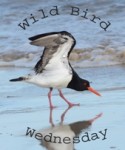The most common resident bird species on our lake is the feral Muscovy Duck. Populations seem to be self-sustaining, but the birds proliferate in locations where humans provide supplemental feeding. There is a small lakeside park a few doors down from us, and families often visit with their children to feed stale bread to the ducks. Several neighbors also feed them quite regularly. We avoid giving them anything, with one exception—when our granddaughters visit. They get such a kick out of handing out bread crusts and seeing them fly in to compete for morsels! We usually pay for our kindness by having the messy ducks lounge on our patio for the next several days and even peck at our back door.
There are probably 50 to 60 Muscovies on our 10 acre lake. There is a distinct pecking order, and at the top of the hierarchy are several older and very large drakes. They defend distinct strips of shoreline, with each Alpha drake controlling about 600 to 800 feet of the lake’s margin and lording over a loose group of much smaller females and younger or lesser males. Our 150 feet of lakeshore are right in the middle of one tough old black drake’s territory. We call him “Pato El Presidente,” pictured above
As is the case with the other Alpha males, El Presidente sports very extensive red bare parts on his face and even has short caruncles, similar to the wattles of a Tom Turkey. In recent weeks, one of the younger males in El Presidente’s flock has become very bold. We call him “Whitewing,” as he has distinctive large white patches on his wings. Whitewing is big– maybe over 20 pounds, and appears even larger than El Presidente. When El Presidente pursues one of the hens, Whitewing is often right behind him, trying to get ahead. El Presidente usually just cuts the younger bird off and sometimes chases him away. Territorial disputes between the drakes are commonly settled with threats consisting of hissing, head bobbing and tail wagging. If a neighboring czar trespasses on another’s established territory, the interloper usually retreats promptly, albeit reluctantly and with dignity.
Around dawn, before the land starts heating up to create the dominant sea breeze, the lake surface is often as smooth as glass. Those were the conditions this morning as I was preparing breakfast, when something caused ripples and waves to radiate out from a point near the shore to the south of our property. I saw that the cause of the disturbance was a fight that had broken out between two of the drakes. The struggle was vicious and prolonged. In the gathering light I recognized El Presidente. He was getting the best of Whitewing, battering him with his wings and grasping him by the neck—even appearing to hold his rival’s head under the water.
Later, I saw Whitewing, standing off from the other ducks. He was missing feathers on the back of his neck. El Presidente still rules! (See subsequent post about the death of El Presidente)













July 15th, 2007 at 5:45 pm i live i the Midwest and there is a male Muscovy duck in the pond in our back yard. do you know how he could have gotten here? do male Muscovy ducks usually have those red dangling things?
October 21st, 2007 at 2:19 pm Stop feeding the Muscovy Ducks, PLEASE!!! They are whey overpopulated tell your friends to stop feeding them too.Please